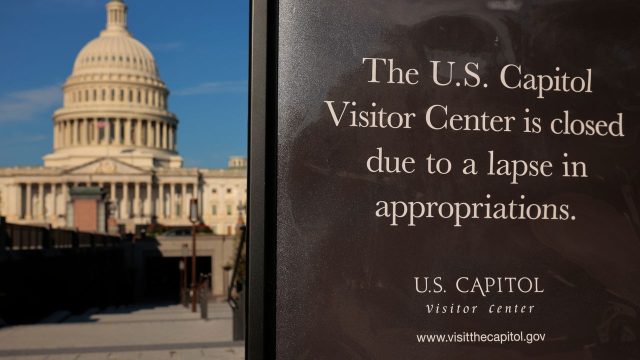
What happened
The federal government shut down this week after Democrats and Republicans failed to strike a spending deal, leaving some 750,000 federal workers furloughed and many in fear that their jobs could be terminated by the Trump administration. The shutdown arrived after days of acrimony and little productive negotiation. Senate Republicans, who need at least seven Democratic votes to overcome a filibuster, insisted Democrats pass a House- approved bill to extend funding through Nov. 21. Senate Minority Leader Charles Schumer and House Minority Leader Hakeem Jeffries said any spending bill must extend the Affordable Care Act’s enhanced subsidies, due to expire in December, and roll back $1 trillion in Medicaid cuts enacted in Trump’s tax and spending law—proposals Republicans called a nonstarter. Trump falsely claimed Democrats want to fund health insurance for undocumented migrants and posted an AI-generated video mocking Schumer and Jeffries, which superimposed a mustache and sombrero on Jeffries and had Schumer refer to Democrats as “woke pieces of s—.”
The White House paused or canceled billions of dollars in funding meant for blue states on the first day of the shutdown, including $18 billion for infrastructure projects in Schumer and Jeffries’ home state of New York. Trump warned that his administration might enact mass layoffs of federal workers and cut programs favored by Democrats if the government remained closed. “A lot of good can come from shutdowns,” said Trump. “We can get rid of a lot of things we didn’t want.” Some Democrats dismissed the threat as posturing, but others expressed worry about what might be coming. Asked if he’s concerned, Sen. Sheldon Whitehouse (D- R.I.) said, “Who wouldn’t be? We have a madman in charge.”
What the columnists said
“The Democrats finally grew a spine,” said Alex Shephard in The New Republic. In March, they had the chance to shut down the government and buck an administration lavishing billions on “Trump’s deportation machine” while slashing health care and social spending. Schumer and nine colleagues caved then, but now they’ve gone to the mat to call attention to a “lawless” administration that wants to “transfer wealth from the poorest people in the country to the richest.” If the Affordable Care Act tax credits lapse, an estimated 4 million people will lose coverage, and 22 million more will see their annual premiums double to an average of $1,904.
Democrats’ demands are “outrageous,” said the Washington Examiner in an editorial, and Republicans are right to stand firm. Undoing Medicaid cuts and extending “failed” Obamacare subsidies would add $662 billion to the deficit over the next 10 years, according to the Congressional Budget Office. A “ransom” of that magnitude just to keep the government running for a few weeks is a “ridiculous” demand designed solely to appease “rabid” progressives.
Both parties are betting the other will bear the brunt of public wrath for the shutdown, said Aaron Blake in CNN.com, but guessing who will prevail is “harder than it’s usually been.” The side that forces a shutdown to gain concessions “is almost always the one that gets the blame.” But the demand to extend Obamacare tax credits is “actually quite popular.” A June poll showed “overwhelming” support for the subsidies, with Americans in favor 77% to 22%. And Trump pollster Tony Fabrizio warned in July that Republicans in competitive districts risk “losing significant ground” if they can be tied to rising premiums and loss of coverage.
Democrats are making “a high-stakes gamble,” said Eric Levitz in Vox. Trump may mean business about using a shutdown “as a pretext for disemboweling the regulatory state.” It’s a longtime goal of his budget director, Russell Vought, who preemptively ordered agency heads to prepare plans for mass firings. That fear kept Schumer in line last March, but there’s reason to believe the threat of mass firings is a bluff. For one thing, it’d be no more legal during a shutdown than at any other time. But this administration “has made clear it has little reverence for constitutional constraints,” and may see the shutdown as an opportunity.
Right now “the route back out is hard to see,” said Jack Blanchard and Dasha Burns in Politico. Republicans say they’re willing to negotiate on health care, but only after Democrats first back a short-term funding extension. Under strong pressure from the base to “show some fight,” Democrats are unlikely to cave anytime soon. Both sides seem to be “digging in for the long haul,” and instead of negotiating in earnest are “chucking insults and posting memes.” Don’t “hold your breath for a speedy outcome.”
As Democrats and Republicans clash over health care and spending, the shutdown leaves 750,000 federal workers in limbo






